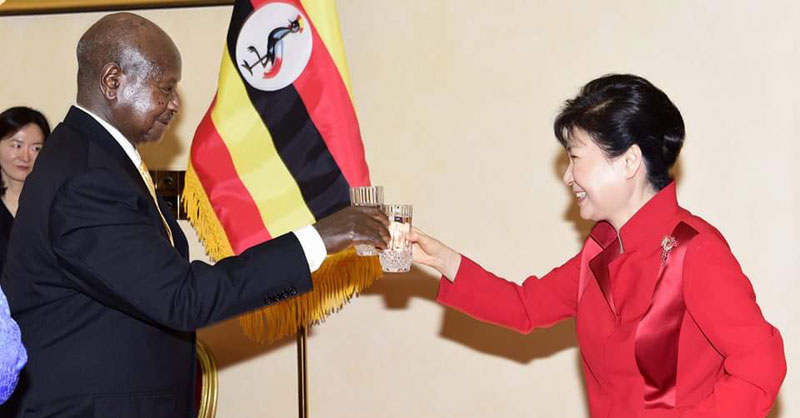Analysis
Behind the high-level South Korea-Uganda talks
Barely three years after South Korea re-opened its Embassy in Uganda, the South Asian country is moving at top speed in opening up avenues for trade as well as cultivating friendly ties in new corners of the world.
The visit last weekend by South Korea’s President Park Geun-hye to Uganda, the first such a trip by a Korean President underscores both the change in Korea’s strategy from an in-ward to a more aggressive international outlook to its development ambitions.
The visit also underscores the significance South Korea attaches to the need to promote its high-tech goods and services especially in fast growing markets such as Africa.
Some experts also aver that South Korea is in a race particularly against the Chinese who’ve grabbed lucrative deals in the transport and energy infrastructure sector that are expanding rapidly across the region.
Indeed President Park’s visit is rumoured to have been motivated by the desire to lobby for the Oil refinery deal especially following UN sanctions against Russians whose RT technologies had won the competitive tender to build the US$2.5bn deal.
Although South Korea’s SK Holdings had come second to Russia’s RT technologies in the bid for Uganda’s refinery, the administration of President Park never gave up on the deal.
Besides the lucrative trade deals, South Korea continue to pursue their enemies North Korea wherever they are in the world and Uganda was bound to be a major target because of its historic ties with Pyongyang.
A statement by the Permanent Secretary Ministry of Foreign Affairs Ambassador James Mugume underlined Korea’s decisive knock-out blow against Pyongyang thanks to the high-level engagements between Park and Museveni. Mugume said: “On March 2, 2016, the UN Security Council unanimously adopted resolution 2276 which imposed stronger sanctions on the DPRK for its nuclear test and ballistic missile launch.
Under Chapter VII and also article 25 of the UN Charter, all UN member states are under obligation to comply with the decisions of the Security Council. In Uganda’s case, we were obliged to suspend military and police cooperation activities with the DPRK government and submit a report to the UN Security Council detailing action taken.” Uganda has been hiring North Korean military experts to train the UPDF and Police officers in martial arts and fitness tests.
The government of President Park recently revealed its determination to pursue all measures necessary to stop Pyongyang from progressing with its discredited goal of building nuclear weapons and the new reach out endeavours by President Park point to this goal.
While South Korea continues to pursue her ambitious agenda to expand trade ties, as well as build its international image as a developed country, this could be a turning point for Uganda which has been described by many as unrivalled in terms of opportunities for growth.
The inauguration of the National Farmers Leadership Centre at Kampiringisa in Mpigi may prove a watershed moment for many Ugandans who are used to handouts contrary to the Saemaul Undong philosophy of self-help, diligence and hard work.
When the farmers’ school opens its doors to Ugandans, it is hoped that they will be inculcated with the badly needed mind-set change principles that helped to transform Korean society from a primitive society to the one of the most dynamic and skilled people in the world.
President Park underlined her country’s intent to play a more active role at the international stage when she launched Korea Aid, a programme that will help take health services closer to villagers through outreach vans staffed by Korean and Ugandan health professionals.
The launch of Korea Aid also complements several other aid initiatives that have been rolled by the government of Korea over the past three years.

President Park (in Orange jacket) touring National Farmers Leadership Centre at Kampiringisa built by her government
Through its mainstream aid agency the Korea International Cooperation Agency (KOICA), Korea is already supporting several development initiatives in Uganda that support girl’s education, improving farmers welfare through vegetable and fruit production in Wakiso and Soroti as well as extend humanitarian hand to people in emergency situations.
President Park and the team that accompanied her arguably signed a record number of ten bi-lateral agreements (Memoranda of Understanding) with Uganda that will guide the two countries’ efforts to cement new ties in the fields of Agriculture, ICT, Defence.
But it was Uganda’s acceptance to finally abandon military ties with her long-time ally North Korea that could be considered as the highlight of President Park’s visit to Uganda as it represents a major blow to their northern rivals’ efforts to develop nuclear weapons through mobilising funds from exporting military ware and know-how.
President Museveni alluded to a potential for greater mutual benefit between the two countries.
Museveni said: “We can buy from and sell to one another. Uganda, with a population of 38 million people, that will be about 100 million by 2050, is, moreover, part of the huge African continent with a current population of 1.25 billion people.”
In the end however the fruits of the new ties for Uganda will depend on a mindset change especially in the attitudes of leaders as well as the population towards hard work, reduced corruption and cultivating a spirit of cooperation.
Comments




















